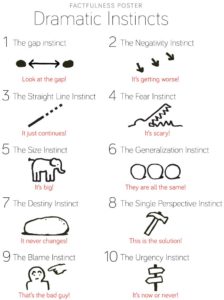Factfulness – Ten Reasons We Are Wrong About The World; And Why Things Are Better Than You Think
Author: Hans Rosling
Genre: Economics, Healthcare
Bill Gates, my personal hero, calls it “One of the most important books I’ve ever read – an indispensable guide to thinking clearly about the world”. That should be reason enough to take a look. By the time you are done, Rosling fills you with immense positivity about the world situation and passion to make a difference.
Rosling, who died of cancer last year, was an adviser to UNICEF and WHO and started Medicines Sans Frontieres in Sweden. His TED talks have been viewed more than 35 million time and Time magazine called him one of the hundred most influential people in the world. In this book, he tries to coach us on “Factfulness: the stress reducing habit of only carrying opinions for which you have strong supporting facts.”
Let’s take a Quiz (the book starts with a longer version of this):
1. In all low-income countries across the world today, what percent of girls finish primary school?
- 20%
- 40%
- 60%
2. In the last 20 years, the proportion of the world population living in extreme poverty has…
A. almost doubled
B. remained more or less the same
C. almost halved
3. The UN predicts that by 2100 the world population would have increased by another 4 billion people. What is the main reason?
A. More children
B. More adults
C. More old people
If we continue to be pessimistic and harbor old notions of poor countries and aging population, this book goes all out to change it. The correct answers are 1.C (most girls finish school even in poor countries); 2.C. (extreme poverty has declined rapidly); and 3.B. (most population increase will be in adults).
Similar reassuring data comes from all sides: Legal slavery has reduced from 193 countries to only 3 in the last 200 years; Every single nation has improved on child mortality; Oil spills have significantly reduced (500+ incidents 30 years ago to ‘only’ 6 now); Child labor has reduced from 28% of kids to 10% in the last 50 years; Nuclear arms have reduced from 64000 to 15000 in the last 30 years, and so on.





 This information will never be shared with third party
This information will never be shared with third party
Really helpful, Thanks a lot for sharing!
Great
This has been my read over the holidays and I highly recommend it. Refrshing insights based on data without unnecessary drama that give hope for for new deceda of our life. The key message is that we should base opinions on facts rather than noise.